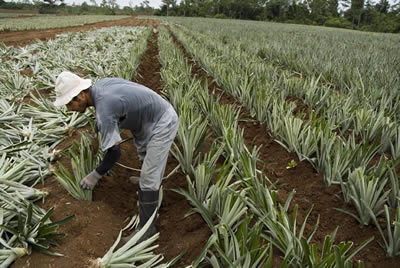ECLAC Analyses Competitiveness and
Social Inclusion in Agriculture

|
| Photo: UNFPA |
As part of an international seminar organized together with the French Embassy in Chile, ECLAC will launch the book entitled Competitiveness, sustainability and social inclusion in agriculture: new directions for policymaking in Latin America and the Caribbean, prepared by experts from the Unit on Agricultural Development of the Division for Production, Productivity and Management of this Organization of the United Nations.
In the book, the authors identify the aspects which have marked the debate on agricultural policy in recent times. They examine the characteristics of regional agriculture and the possibilities of its insertion in global agriculture in the future, and they also assess the lessons learnt and the problems which public policies come up against today.
The study tries to answer recurrent questions relating to agriculture, for example: How can the competitiveness of regional agriculture be increased, while at the same time reducing social inequality and poverty? How can this development process be made more sustainable? What are the most appropriate institutional schemes for driving agricultural and rural development? What is the role of social actors in the new structures of governance?
According to the book, a number of factors have changed the situation which was prevalent in agriculture and the world economy during the second half of the 20th century.
The new situation is marked by the growing scarcity of natural resources, the effect of climate change on agriculture, the new health risks generated by increasing trade, the range of technological innovations such as biotechnology and nanotechnology, migrations and the rise of China, India, Brazil and other emerging countries with a new global middle class which gives rise to new requirements in terms of food demand.
Other phenomenon which are changing the terms of the debate on the role of agriculture in society include the ageing population in developed and developing countries, and the growing "financialization" of agricultural raw materials and their effects on the volatility of food prices.
Over the past years, the differences in countries' abilities to deal with the rise in food prices have become evident. While net food-importing countries --in particular Mexico and those in Central America and the Caribbean-- have been negatively affected by the increase in prices over the past years, others have seen their capacities to become suppliers of first order foods in the world strengthened.
The new ECLAC book will be presented during the International Seminar Policies for agriculture in Latin America and the Caribbean: competitiveness, sustainability and social inclusion, which will take place on 6 and 7 December at the headquarters of the Organization in Santiago, Chile.
This meeting is aimed at high-level officials of ministries and secretariats on agriculture in the region, and professionals from agricultural research institutes, regional organizations in the agricultural sector, guilds and civil organizations which work on the design and implementation of agricultural and rural policies.
The event tries to analyse how agricultural policies, needed to deal with the challenge of food security in the region, are being designed and implemented in a situation of recovery from rising food prices and an increase in volatility in agricultural raw materials markets.
More
IN FOCUS
Economic Policies Must Consider Unpaid Work of Women
|
|
|
| One of the questions which the study tries to answer is: How can the competitiveness of regional agriculture be increased, while at the same time reducing social inequality and poverty? | |
|
|
|
| The book will be presented during an international seminar on policies for agriculture in Latin America and the Caribbean which will take place on 6 and 7 December at ECLAC headquarters in Chile. | |